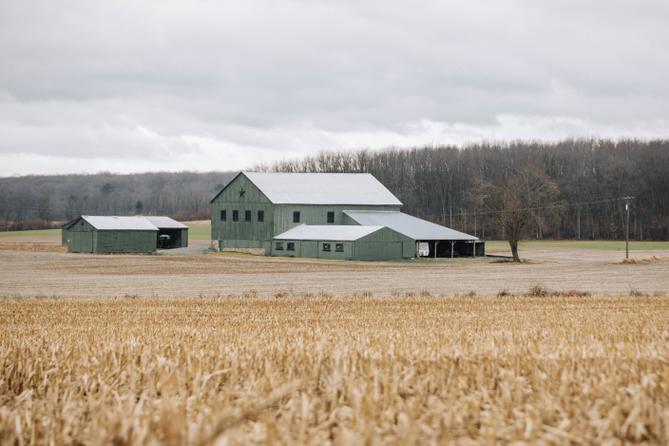BELLEFONTE — Officials in rural Pennsylvania didn’t get everything they wanted in the state’s $47.6 billion budget, but they say the money earmarked for agriculture, health care, and workforce development is promising for their communities.
This year’s spending plan was passed by state lawmakers in the divided legislature and signed by Democratic Gov. Josh Shapiro last month.
Local officials say the investments in workforce development and health care help address concerns about rural areas losing people in coming decades. But to the disappointment of some, funding for a popular housing repairs program and hiking trail improvements didn’t make it into the final deal.
Here’s a look at what the budget does, and doesn’t do, for the state’s rural counties:
Agriculture
Pennsylvania farmers will have the opportunity to apply for their share of a new $10 million grant program to support innovative practices to optimize their work.
In his budget pitch earlier this year, Shapiro cited a methane digester that turns waste into energy on a Juniata County farm as an example of the kind of ideas that could receive funding.
While industry stakeholders welcomed the proposed program, some farmers previously told Spotlight PA that they’d rather see the state fund agricultural research and assist with helping them transition toward producing processed goods that reflect industry trends.
Now that the grant program is official, the Pennsylvania Farm Bureau, an industry group that represents thousands of farmers, says the effort will support new technologies and conservation efforts.
“Continuing to invest in agriculture is vital, as it creates food security for our state and our nation,” Farm Bureau President Chris Hoffman said in a statement.
Economic development
After Pennsylvania lost a bid to have major dairy brand Fairlife build a new production facility in the state last year, lawmakers blamed permit challenges and a lack of construction-ready sites.
The final budget reflects lessons learned from the lost opportunity, which would have been a $650 million investment. It earmarks $400 million for grants or loans to prepare commercial and industrial sites for development through the Pennsylvania Strategic Investments to Enhance Sites program. The state Department of Community and Economic Development administers the initiative, which launched as a pilot program last year and aims to make properties “shovel-ready.”
The investment also builds on the Shapiro administration’s plan to grow the state’s agriculture sector.
Lawmakers also approved a streamlined process for some air, water, and land disturbance permits. The new program lets the Department of Environmental Protection use a third-party expert to review permit requests if the applicant pays for an expedited review.
Health care
Health care administrators say workforce shortages and increased operating costs have exacerbated longstanding financial problems. The issue is especially urgent for hospitals in rural areas, where residents tend to be older and more reliant on Medicare and Medicaid. The government-run programs reimburse hospitals at lower rates than private insurance.
The budget allocates $34.5 million for rural hospitals, including tens of millions in emergency relief funds, medical assistance fees, and obstetric and neonatal care, which have become difficult to access in more remote areas.
The Hospital and Healthsystem Association of Pennsylvania said the spending plan will help keep hospitals and other providers open in rural Pennsylvania.
Kendra Aucker, president of WellSpan Evangelical Community Hospital in Union County, told Spotlight PA in a statement that the budget “provides some relief,” citing the one-time payments to rural hospitals and emergency relief dollars.
Still, she noted the ongoing struggles faced by rural providers and said officials plan to work with policymakers “to advocate for healthy and economically strong rural communities and ensure all Pennsylvanians’ access to high-quality care.”
Housing
The Whole-Home Repairs Program, which was popular statewide after lawmakers created it in 2022, didn’t make it into this year’s budget. The lack of funding came as a blow to counties with lengthy waitlists of homeowners looking to complete home improvement projects.
Research funded by the Center for Rural Pennsylvania, an agency overseen by the state legislature, found that people living in rural communities tend to have lower-quality housing.
Centre County has received $1.3 million from the program, which supported improvement and safety projects for about 65 households, said Faith Ryan, the county’s deputy human services administrator and director of adult services. However, the waitlist — now frozen due to the lack of new funds — has 85 applicants, she added.
As more data and feedback on the program become available, Ryan said she hopes the state will recognize a need and fund Whole-Home Repairs again.
Outdoor recreation
After launching the state Office of Outdoor Recreation as part of last year’s budget, Shapiro proposed investing in hiking trails and skills training within the industry.
However, the governor’s request for an additional $8.5 million for the state’s trails wasn’t included in the final budget deal.
Outdoor recreation is a multibillion-dollar industry in Pennsylvania, according to federal estimates.
Lawmakers missed “a significant opportunity to boost rural economies” by punting on the governor’s request, said Josh Raulerson, communications director for the Pennsylvania Environmental Council.
Brook Lenker, executive director of the Keystone Trails Association, echoed this disappointment but acknowledged the 15% increase — $23 million — to the Department of Conservation and Natural Resources’ budget would help bolster workforce development.
“The included funding for the Pennsylvania Outdoor Corps is invaluable, but millions of dollars were left out that would enhance DCNR’s capacity to build and tend a more sustainable trail system,” Lenker told Spotlight PA.
SUPPORT THIS JOURNALISM and help us reinvigorate local news in north-central Pennsylvania at spotlightpa.org/donate/statecollege. Spotlight PA is funded by foundations and readers like you who are committed to accountability and public-service journalism that gets results.
